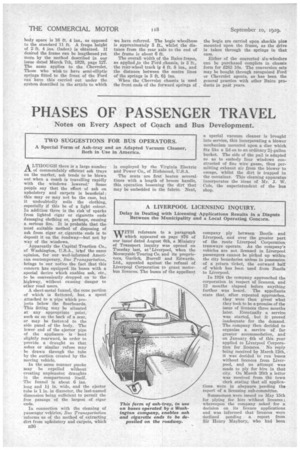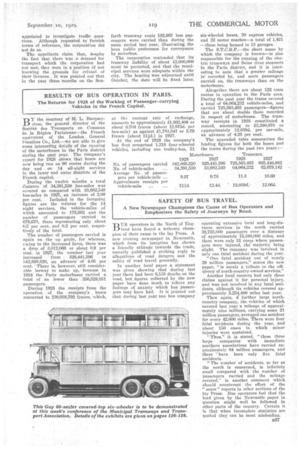A LIVERPOOL LICENSING INQUIRY.
Page 62

Page 63

If you've noticed an error in this article please click here to report it so we can fix it.
Delay in Dealing with Licensing Applications Results in a Dispute Between the Municipality and a Local Operating Concern.
company ply between Bootle and Liverpool, and over the greater part of the route Liverpool Corporation tramways operate. As the company's vehicles are not licensed in Liverpool passengers cannot be picked up within the city boundaries unless in possession of a return ticket, the outward half of which has been used from Bootle to Liverpool.
In 1924 the company approached the corporation in respect of licences, and 12 months elapsed before anything further was heard. The appellants state that, after repeated approaches, they were then given what they took to be a promise of the issue of licences three months later. Eventually a service was started, but it proved inadequate for the demand. The company then decided to organize a service of far greater accommodation, and on January 4th of this year applied to Liverpool Corporation for licences. No reply being received by March 12th, it was decided to run buses without licences from Liverpool, and no attempt was made to ply for hire in that city. On March 26th a letter was received from the town clerk stating that all applications were in abeyance pending the report of a licensing sub-committee.
Summonses were issued on May 15th for plying for hire without licences; whereupon the company asked for a decision on its licence applications and was informed that licences were declined pending a report from Sir Henry Maybury, who had been appointed to investigate traffic questions. Although requested to furnish terms of reference, the corporation did not do so.
The appellants claim that, despite the fact that there was a demand for transport which the corporation had not met, they were in a position of not knowing the grounds for refusal of their licences. It was pointed out that in the past three months on the Sea forth tramway route 182,967 less passengers were carried than during the same period last year, illustrating the keen public preference for conveyance by motorbus.
The corporation contended that its tramway liability of about £3,000,000 must be protected, and that the municipal services were adequate within the city. The hearing was adjourned until October, the date will be fixed later. six-wheeled buses, 30 express vehicles, and 22 motor coaches—a total of 1,421 —these being housed in 13 garages.
The S.T.C.R.P.—the short name by which the company is known--is also responsible for the running of the electric tramways and Seine river steamers in the Paris district, and it is interesting to note that a greater mileage is' recorded by, and more passengers carried on, the tramways than on the motorbuses.
Altogether there are about 122 tram routes in operation in the Paris area. During the past year the trams covered a total of 64,064,232 vehicle-miles, and carried 725,563,463 passengers—figures that are about double those recorded in respect of motorbuses. The tramway receipts in 1928 constituted a record, amounting to £3,280,970 or vpproximately 12.039d. per car-mile, an advance of 4.28 per cent.
The appended table summarizes the leading figures for both the buses and the trams during the past two years:— Motorbuses. Tramcars.
1928 1927 1928 . 1927
342,868,520 329,441,596 725,563,463 685,446,982 34,391,530 33,682,549 64,064,232 62,679,142 1lid. 12.4d. 12.039d.• 12.06d. 9.97 9.78 11.3 10.69




















































































































